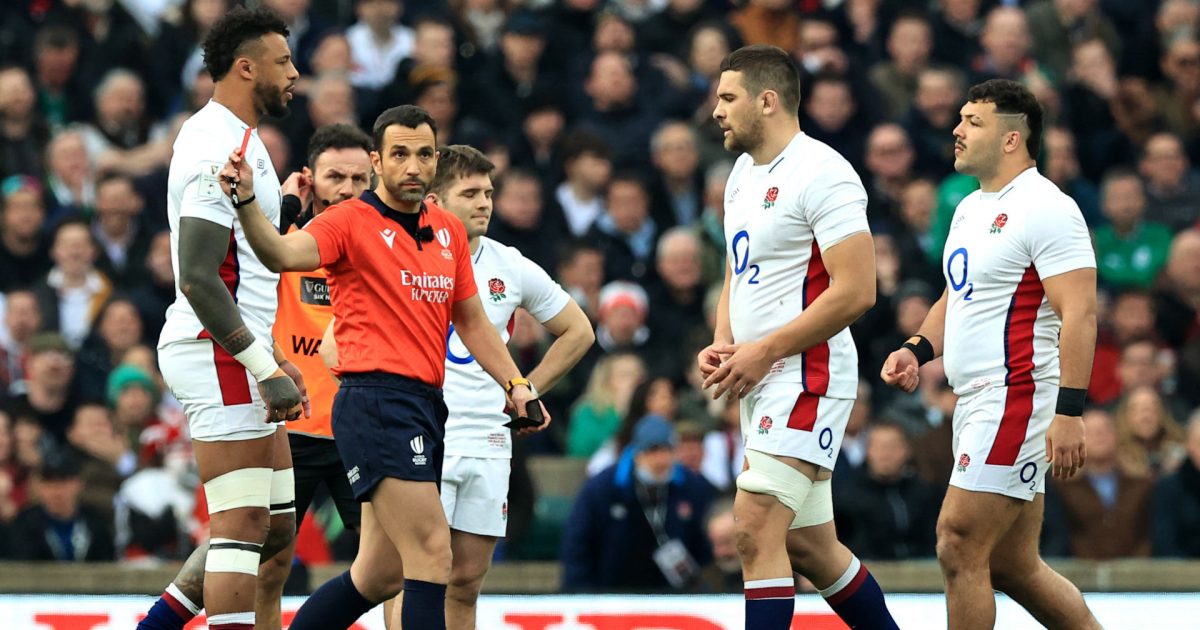World Rugby seeks to expand controversial 20-minute red card trial

World Rugby will consider introducing the 20-minute red card as a global law trial despite concerns that it could diminish the deterrent effect. The law, which is being trialled in Super Rugby, means the dismissed player can be tactically replaced by a substitute after 20 minutes.
England lock Charlie Ewels was sent off after 82 seconds against Ireland in the Guinness Six Nations last month, with many observers feeling the dismissal ruined the game as a contest. World Rugby, however, is determined to keep lowering tackle heights and the Super Rugby trial so far has proved inconclusive.
“That has been discussed before and will be discussed again,” World Rugby chief executive Alan Gilpin told the Daily Telegraph. “It would be great if more competitions, even in a closed trial, would use it because that would give us more of an overview of the effect it would have on the game.
“We need to see more of the data to see whether that strikes the balance between safety and spectacle better. There is more work to do to analyse that and the concern is if a team goes back to 15 players, is that enough of a deterrent to drive that behavioural change? We would like to see it trialled more widely before drawing any conclusions.”
World Rugby’s interest in a global trial of the 20-minute red card goes against the opinion of recently retired Test centurion referee Nigel Owens, who some weeks ago outlined to RugbyPass his dislike of the law in use in Super Rugby. Referencing the Ewels red card for England in the Six Nations, he said: “People need to stop thinking that red cards ruin games because a red card is given for a reason when clearly there is an act of foul play or recklessness, and if the referee gives a correct red card then it’s irrelevant whether it ruins the game or not.
'In the beginning, I thought it was a good idea, that this could open up the game, but I'm just not seeing it.'@Nigelrefowens on red cards, concussion, Wales' Six Nations flop, saving the scrum, and the one new law he's not a fan of, writes @heagneyl ???https://t.co/fDjh6sohBp
— RugbyPass (@RugbyPass) March 27, 2022
“It didn’t in this instance [Ewels], it probably added to the game. People say, ‘It’s a bit of an unlucky red card’. Well, if it’s an unlucky red card then it shouldn’t be a red card. A red card is nailed on and that red card was nailed on. You can say the player didn’t try to do it – that is irrelevant.
“This was a nailed-on red card, it didn’t ruin the game and people talking about this orange card, if you’re going to have a player sent off and in 20 minutes you get another player coming on instead of him, that isn’t going to change player behaviour. It isn’t going to make coaches really hit home to players you have to change tackle techniques because if you’re going to be back up to 15 men for 60 minutes compared to being down to 14 men for 80, I don’t think that is enough of a deterrent for player behaviour.
“So a red card is a red card for a reason and you shouldn’t be replaced because the Irish player [James Ryan] left the field and didn’t play the following weekend. He was out of the tournament so player safety is paramount. Yes, the red card was a big call at the beginning of the game but the referee was 100 per cent correct.”
The 20-minute red card is already available as a closed trial (as per Super Rugby) but cannot be considered for global adoption before the next women’s (later this year) and men’s (2023) Rugby World Cups. The 20-minute red card was not supported by World Rugby when the global trials were considered back in May 2021, but dispensation was given to any competition wanting to run it as a closed trial.



















































